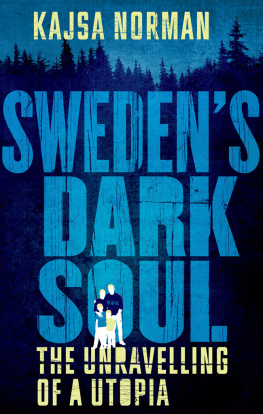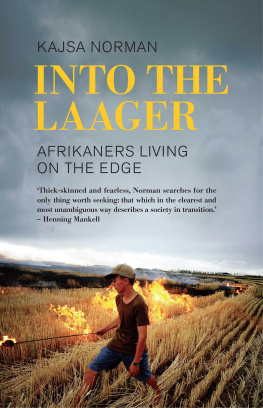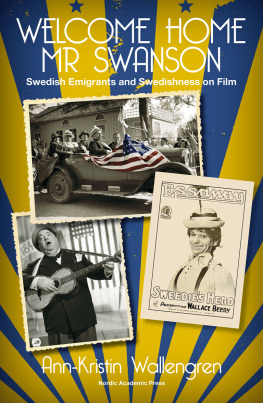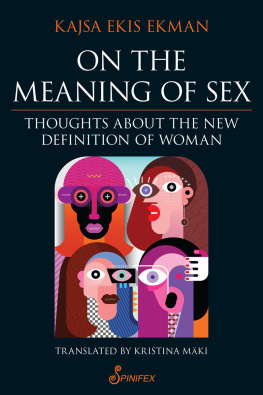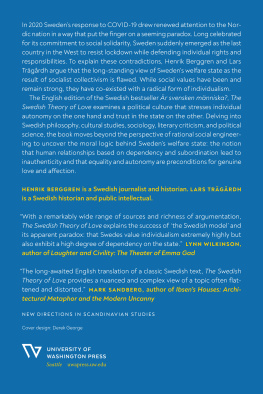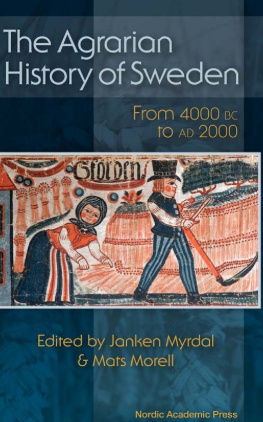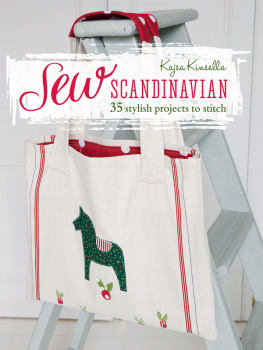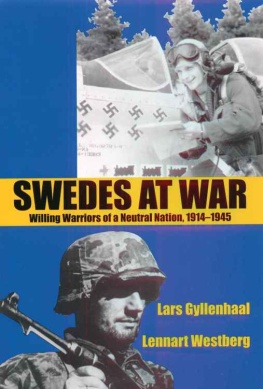KAJSA NORMAN
Swedens Dark Soul
The Unravelling of a Utopia

HURST & COMPANY, LONDON
First published in the United Kingdom in 2018 by
C. Hurst & Co. (Publishers) Ltd.,
41 Great Russell Street, London, WC1B 3PL
Kajsa Norman, 2018
All rights reserved.
Second impression, 2019
Distributed in the United States, Canada and Latin America by
Oxford University Press, 198 Madison Avenue, New York, NY 10016, United States of America.
The right of Kajsa Norman to be identified as the author of this publication is asserted by her in accordance with the Copyright, Designs and Patents Act, 1988.
A Cataloguing-in-Publication data record for this book is available from the British Library.
ISBN: 978-1-7873-8182-7
www.hurstpublishers.com
I, as well as the government to which I belong, will, in every context, forcefully stigmatize [brnnmrka] those who speak ill of Sweden abroad. We dont need those types of efforts now. Now, our success is in the balance. We need ambassadors for our cause.
Prime Minister Gran Persson in a parliamentary debate,
14 June 1995
.
CONTENTS
PART ONE
THE CRIME
PART TWO
OUTCASTS AND THE RISE OF THE UNIMIND
PART THREE
THE DISSIDENT, THE IMMIGRANT,
AND THE FIGHT FOR THE UNIMIND
PART FOUR
ON THE TRAIL OF THE CULPRIT
In many ways, I am the Swedish norm. I look Swedish. I sound Swedish. And, for many years, I thought Swedishly. I was born and raised in the north, in a series of near identical apartments built by the state to ensure that everyone had an equal standard of living.
My family has been working-class for generations. My mother worked in a cafeteria and my father in a sewage plant. Grandfather was in the lumber industry in dalen when the military opened fire on striking workers in 1931. The outrage fueled by the resulting deaths became the tipping point that launched the subsequent era of Social Democratic hegemony. It shaped him, it shaped my parents, and it shaped me.
I was 7 years old when our Prime Minister Olof Palme was murdered in 1986. The news of what had happened hit my father like a bullet in the chest, and when he sank to the floor crying, I did the same. We were socialists. Not active in the party, but part of the silent support base; part of the collective to which everyone we knew belonged. People like us thrived through the redistribution policies and welfare reforms that turned Sweden into one of the most egalitarian nations in the world. Unlike my grandparents and my parents, I never experienced poverty. Free education and healthcare ensured that I received the same opportunities as the children of the most affluent families in our town.
My Sweden was predictable and secure, but also boring. As a writer, I was always more interested in far-away places with greater passion and conflict. Consequently, I devoted my career to writing about dictatorships and political oppression in countries such as Cuba, Zimbabwe, and Venezuela. Then, one day, a disgruntled Afrikaner reached out to me. He had just read my book Bridge Over Blood River, about the post-apartheid landscape in South Africa, and was not happy with my portrayal. Swedens greatest export is unsolicited advice. Why dont you start by taking a look at your own country? he suggested.
Meanwhile, Swedish crime literature had taken the world by storm, spurring a renewed interest in all things Nordic. By 2012, an estimated 50,000 to 100,000 news articles had been written about crime phenomenon Stieg Larsson and his Millennium trilogy. This translated to an advertising value of roughly $50 million, according to a government agency. But what was being advertised? The agency concluded that the Stieg Larsson Effect had brought about an irreversible transformation of the Swedish brand:
The events [in the books] are in stark contrast to established stereotypes about Sweden: the safe country that many people imagine to be an egalitarian paradise turns out to contain extremism, racism, oppression of women, conspiracies, and a system that indirectly sanctions abuse of the weakest members of society Ill-will lurks even in the most idyllic of places and nature provides no refuge from evil The notion of Sweden as a conflict-free model nation is shattered.
While obviously fictive and exaggerated, Larssons books are filled with actual statistics that underpin the grim reality behind his stories of misogyny, cold-hearted bureaucracy, and Nazism. Beyond their pop-culture trendiness, there was something deeper about these stories of dystopic, systemic injustice that resonated with me. Perhaps the disgruntled Afrikaner was right; perhaps I really ought to pursue the dark themes lurking beneath the polished surface of my homeland.
* * *
Then, one day, while living abroad, I learned of a real-life crime in Sweden so disturbing and strange that I was pulled into its web. I began the process of tracing the people involved and the events leading up to and following the crime, and soon picked up the trail of a series of invisible forces that seemed to have driven the behaviors of those involved. The more I learned, the more I understood that this crime was quintessentially Swedish, that my book about my country would be a non-fiction variant of Swedish noir.
While the protagonists of Scandinavian Noir tend to be troubled outcasts, the villains are often representatives of the statepersonifications of a flawed system. The crime I was investigating had its cast of immediate victims and perpetrators, but, as in any good noir, the roots of the evil extended much deeper, as did its casualties. The more I dug, the more warnings I received: Arent you afraid? You realize youll never be able to work in Sweden again. Theyll come after you hard. If they cant discredit the message, theyll find a way to discredit you.
I was surprised, but also intrigued. As a journalist, as well as in my capacity as an army press and information officer, I have worked in many dangerous places. I have served the Swedish Armed Forces in Afghanistan and Mali, been chased by security police in Zimbabwe, and been threatened by Cuban intelligence officers in Havana. Yet, at no point have my Swedish family members, friends and interviewees expressed more concern regarding my personal and professional risk-taking than while I was working on this assignment. It seemed bizarre, but perhaps it was a sign; perhaps my country was not the exemplary democracy I had been raised to admire. In my research I was repeatedly reminded of a powerful quote by our former Prime Minister Gran Persson: I, as well as the government to which I belong, will, in every context, forcefully brnnmrka those who speak ill of Sweden abroad.
The Swedish verb brnnmrka means to mark something with a burn. It is the process whereby a heated branding iron is pressed against flesh with the intention of leaving a mark. While mainly used with livestock, in the Middle Ages it was also used to mark heretics, who would be branded on the forehead with a B for blasphemy. Over time, brnnmrka has become a colloquial expression, used as a harsher form of the verb to stigmatize. When used about cattle, it conveys a combination of brutality and entitlement. But when used about humans, it betrays in its speaker a dangerous combination of contempt and fear. Its hard to know exactly what Prime Minister Persson had in mind when he made the statement. Did he think of the Swedish people as cattle? Or was it the medieval practice of branding heretics that prompted the association?
Fears of being personally victimized are as prevalent amongst segments of my own countrymen as amongst dissidents in the dictatorships Ive scrutinized. Among my interviewees, psychologist Hans and police officer Lars asked to have their names changed, and Hans for the identity of his relatives to be protected, for fear of both professional and personal repercussions. However, my two main protagonists, dissident Chang Frick and Armenian immigrant Samvel Atabekyan, have both opted to keep their real names. One could argue they have less to lose; as you will soon learn, they are already outcasts, each in his own way.
Next page
